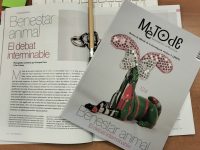|
Yesterday I was working on a communication project aimed at the wide audience and again I made the same mistake of those enthusiasts of science: focusing on the steak and belittling the chips. When one goes to the restaurant and reads the menu, he will obviously choose a dish because of its main content and not because of the side. We choose meat or fish, cooked this way or the other, sometimes without even paying attention to the garnish. However, if you pay attention, many times, when we have the dish in front of us, chips are the first thing we take to our mouths. And whether they turn out to be tasty, with perfect texture, or scarce and from a bag, they influence our final opinion as much or more than the steak itself. The same thing happens with scientific communication: scientific contents are the steak, but the garnish with which we accompany them is essential. And to keep the simile going, some of us make a mistake when focusing too much on the steak’s quality and neglecting the chips considering them a secondary complement. Obviously, if someone is a gourmet and goes to a barbecue expressly to taste good meat, what is truly important is the quality of the cut and its cooking. Similarly, the sophisticated readers who look for quality content want scientific meat of the first level, without gorging on an excess of unnecessary chips or imperfect peppers. Without a doubt there must be restaurants for these scientific sybarites. But, realistically, clients like these are few, and the real challenge we cooks have is not satisfying them, but stopping the scientific malnutrition of society. What is more, even the sophisticated ones differentiate between a Sunday’s meal and an everyday meal. Make no mistake: when you ask for a steak in a restaurant with your daily menu, chips make a great difference. And if you unexpectedly find a roasted artichoke or a pepper that gives it colour, the steak becomes much more appetising. Imagine for a moment asking for a steak and getting it alone in the middle of the plate. It would be sad. Boring. You would surely complain, as do many readers who, when reading the «science» option in some menu, the say «all right, today I will go for this», and we give them a good quality scientific steak but no chips to entertain in between bites. Again, if you are a carnivore you might enjoy it, but the majority of the people will find it boring (even more so the children) and will not ask for science again. Bad communication is counterproductive. It would be better if some communicative actions did not exist. And, obviously, the opposite does not work either. There has to be a balance: if you ask for a steak with chips and you get a brimming portion of tuber strips with a diminutive piece of meat, or a badly cooked one, or of poor quality, as tasty as the chips may be, we will call the waiter and say «hey, I asked for meat!». This is also a defect of a certain communication with a complex and an excessive fear of people not liking science, which is more concerned with disguising the scientific meat by covering it up with chips and sauces until the essence disappears. It is an excess. They may be successful in the number of visits, as McDonald’s has commercial success. But that does not mean at all that the product is good. We all know some restaurant with the perfect formula, where we go ask for a steak because we know it is good, but salivating because of the copious portion of medium chips they serve. Let us care for the scientific steak, but not belittle the communication chips. It seems simple, but that is not the case. The great difference is that, in general, it takes little for the cook who knows how to cook a good steak to prepare some tasty chips, whereas the scientific communicator is good at identifying the good quality scientific cut and sear it in the griddle, but he is not so good with the chips. Those take more time and effort for him, and they tend to end up underdone, overcooked, sticky or salty. Fortunately, there are teams where one makes the steak and another the chips, and professionals who do not work in an amateur way. The specific case that had me busy yesterday is a television series on science in Ecuador that, when you read this text, will have me immersed in filming all over the country, but that yesterday had me enthusiastically absorbed defining the scripts. It makes me so excited to travel to Ecuador and to explore this Latin American science, so innovative and socially committed, that in each of the 13 episodes I want to explain a lot of cases and interview every researcher that fits in the running order. It is not that I only worry about the steak. Much worse. In each script I was cooking a whole grill with sausage, chicken and pig ribs included. «When will people rest?», the producer wisely asked me, making me see that I cannot intend to stuff them for 30 minutes of intellectual steak without offering them chips and a good Rioja to make the science more digestible. So true. It is hard to believe that after so many years I still have to be reminded that scientific communication is like the steak with chips. Passion makes us do crazy things… Pere Estupinyà. Writer and scientific communicator (New York). |
 Moisés Mahiques Moisés Mahiques
«Bad communication is counterproductive. It would be better if some communicative actions did not exist» «Let us care for the scientific steak, but not belittle the communication chips. It seems simple, but that is not the case» |
Search
© Mètode 2015 - 85. Online only. Living with climate change - Spring 2015
Pere Estupinyà
Writer and science communicator, Madrid. He is the host of El cazador de cerebros (La 2).





